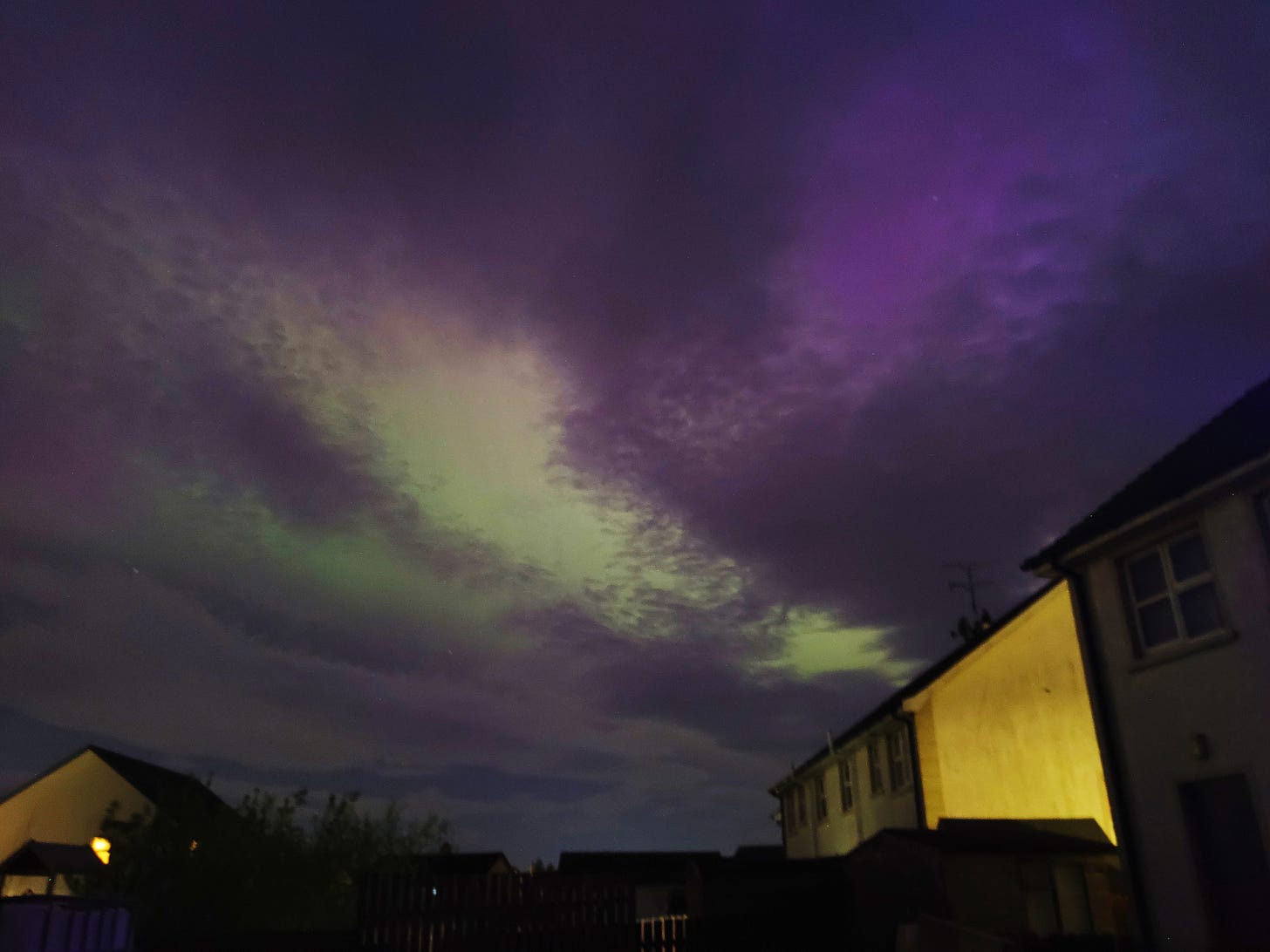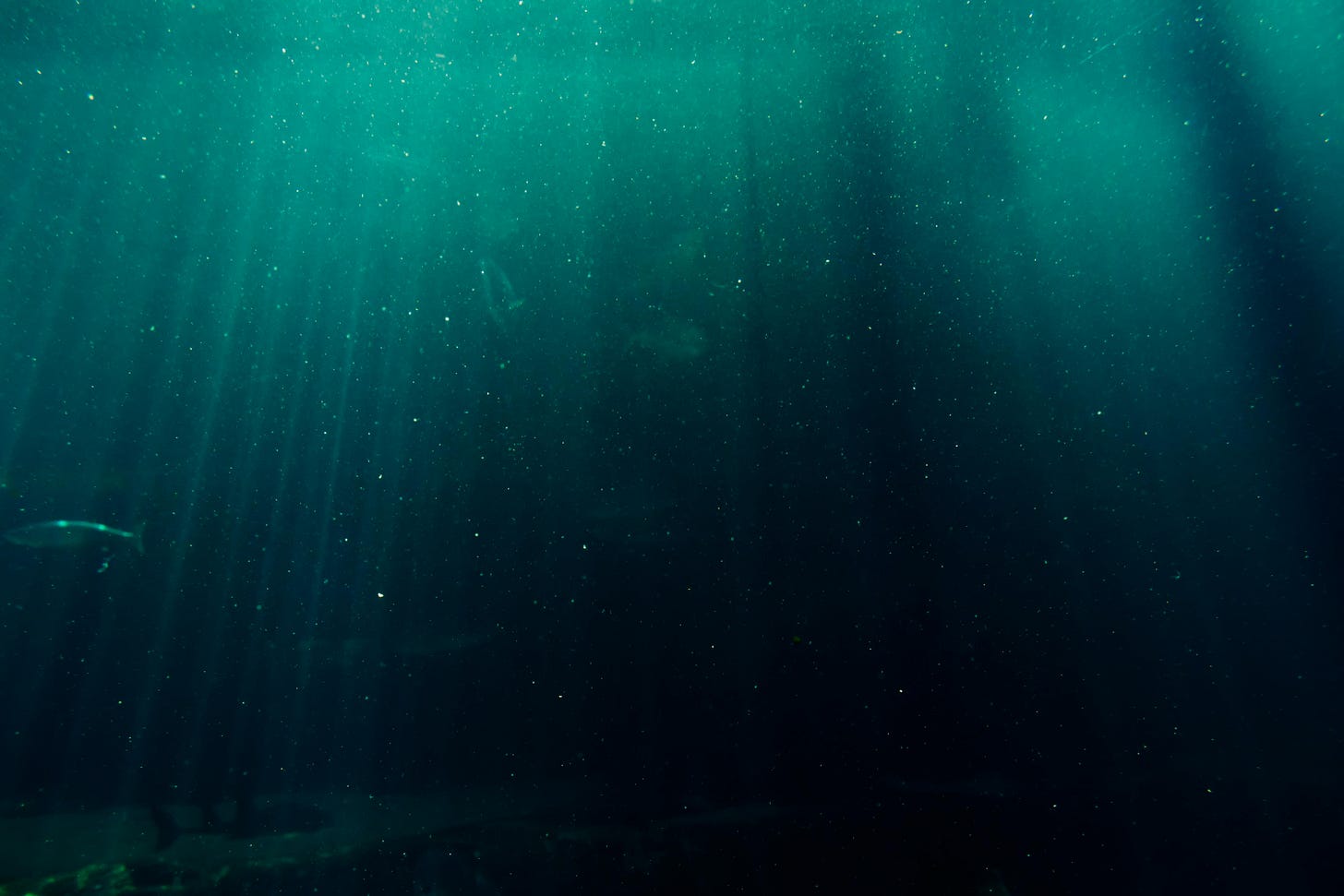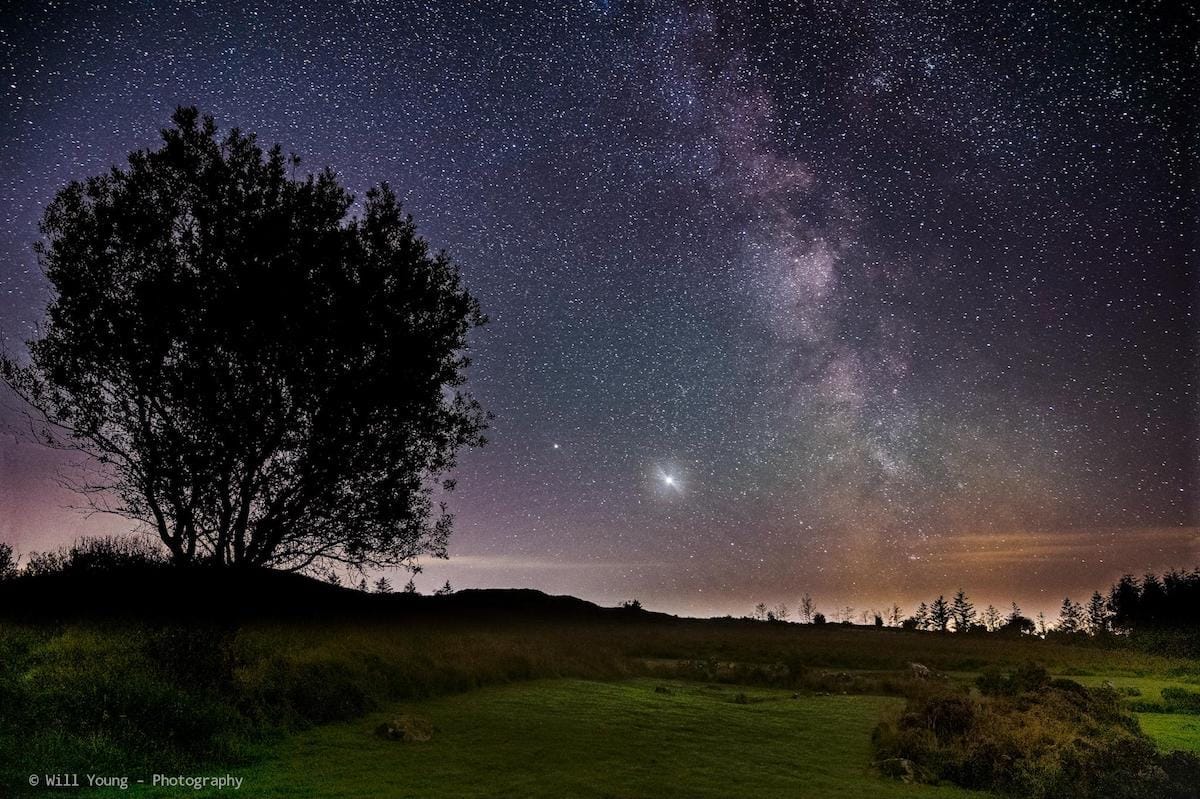I am finishing these lines on the last day of September, just over a week after the Autumn Equinox, Cónocht an Fhomhair in Irish, to be published on the first day of October. The Equinox caught me off guard, in a moment of astonishment upon realising how close we were to October. I tend to lose my permanently bad sense of time even more once we enter these slumbering months when I spend a lot of time writing and contemplating. There is something coming out of it though - three pieces of my writing (an essay and two poems) have recently been accepted for publishing, and I will share more about that soon.
“Bittersweet October. The mellow, messy, leaf-kicking perfect pause between the opposing miseries of summer and winter,” as Carol Bishop Hipps1 has elegantly put it, and today's wet day certainly makes the promise of winter more bitter than sweet. There has been torrential rain for twenty-four hours straight now and the roads are full of fallen leaves drenched in deep, cold water. It is that time of the year when the foliage is still mostly green, only that green is not the fresh, bright green full of life, but dull, suppressed green of old leaves preparing to fully cloak themselves in rust and gold. The garden is quiet, save for the whooshing noise of the rain, with most birds taking shelter from strong winds, and a single misguided sparrow is all I have seen today. Like a precise clockwork, freezing raindrops, dark clouds and howling winds came the morning after the Equinox, the astronomical beginning of autumn, announcing a change once and for all after a full week of untypically warm temperatures that saw us enjoying family strolls in airy dresses and taking cold dips in the harsh waves of the Atlantic ocean.

That single warm week was a welcome respite. This entire summer has been wet and cold. In fact, the entire year was like that, and I do not think I am exaggerating when I say this has been one of the wettest and coldest years in recent memory. It is impossible not to notice that some forked tongues readily adopted this as a proof of climate change being a hoax — as if the screams of Gaia around the globe are any more silent in a year when the jet stream brings more precipitation to Ireland and Britain. We spent the summer forced to turn the heating on most evenings. We spent the days observing ghastly gossamer threads spun over the meadows, dull and soaked, permanently unable to glisten in the sun, muted and obstructed by a veil of dark, grey clouds. There were no “dog days” this summer, that loosely defined stretch of sultry days that was historically tied to the heliacal rising of Sirius, the Dog Star, once believed to induce lethargy, disease and madness in humans. There was and still is a madness present in human society, there is no doubt about it, but one tied not to a distant constellation in the summer sky, but the tragedy of human disconnection from the Earth and Universe. The madness keeps on galloping, bomb after bomb, bullet after bullet, the ground razed so deeply the Earth's very bones and veins are exposed. Mythological or folkloric explanations for our madness do not suffice; this ailment is entirely a product of modernity that deconstructed, erased and demonised our perception and relationship with Nature. If only I could simply ascribe the madness to the Dog Star, in some perfect world where the emptiness of what we came to call “civilisation” does not even exist…

Meteorological autumn started much earlier, on the 1st of September. That date did not change much, for autumn already arrived a month before that, in early August, with Lughnasadh that the ancient stewards of this land marked as the turn of the wheel, halfway between Summer Solstice and Autumn Equinox. The harvest season that fills the nostrils with a fermented scent of cut barley and berries accidentally missed or intentionally left on the branches to rot and feed the soil. Here in Ireland, this ancient measurement of time and seasons suits the soil and soul far better than the meteorological and astronomical seasons we established in more recent times. The first days of September arrived carried on the wings of the birds small and big. A commotion was evident in the sky, a palpable preparation for the birds’ long flight southwards while others descend upon these shores to overwinter. Even the seagulls sounded differently, their shrieks coloured with a tinge that hinted at the slumber to come. The air was filled with the scent of autumn, not yet characterised by mushrooms and decomposing leaves, but vaguely reminiscent of that heavy summer scent that comes after the rain, when dust absorbs the water and dries in the warmth of the summer sun, only it was now slowly being extinguished and cloaked in the moisture of the fog descending down the hillside. September did not come kindly, as September often does, with some of the last glimpses of almost suffocating heat. Instead it came in a gust of freezing wind after the last day of August deceived us with its short burst of warmth and clear, blue skies with only a couple of distant clouds bunching together low on the horizon. With chill in one's bones, it was hard to feel like there will be the proverbial “Indian summer” or, in an Irish expression much closer to my heart, “little autumn of the geese,” fómhar beag na ngéanna. And yet, through the gloomy and waterlogged conditions of this summer, the Earth still transformed as She always does, singing in harmony far older than the soil under our feet. The garden we are rewilding, almost fully overtaken by moss in winter and spring, suddenly sprung to life, the ground silently soaking up the constant influx of rainwater. A perpetual reminder that no matter how bleak things seem, life will prevail and flourish again. We silently rejoiced in our rare warm days and weeks, now we bid them farewell.

When I was a child, the school taught me that the beginning of autumn was the Autumn Equinox that happens around the 21st of September — now I know and feel that the Equinox is really the mid-autumn, steadily leaning into winter. Whatever date speaks to your heart and hearth, autumn is here, now, in the nostrils, in the pores of our skin; in the ponds growing ever so muddy, in the old family nest of swallows that are now heading to the gentle southern sun in winter. In the mornings, I no longer see the slopes of the hills behind the fields and hedges; my kitchen window now looks at a wall of fog starting just past the hedge, smoothly rolling over the pasture and sheep flocking together tightly, their fleece sprayed with cold mizzle. We already had some frosty mornings. The hedge still sits there silently, more withered by the day, a liminal border inhabited by an odd robin and wren, its bleakness only coloured by the last decaying pink flowers of the hairy willowherb, its roots invisible under a plethora of sticks and thorns. I can smell it in the air. Autumn is in our thoughts and desires, now swinging towards the abyss of the soul, filled to the brim with the woes of the world.
The coldest night of the entire summer happened in mid August, with a sudden drop to mere five degrees Celsius, coinciding with the peak of the Perseid meteor shower and a large aurora borealis.

This was the first night I became fully aware how much the days have shortened and that our lingering northern daylight is not extending to 11 pm anymore. I went outside to sit in the garden that night, just past midnight, with the aurora waning and shooting stars waxing, husband and children long in bed. There was no spot in the garden that could shelter me from the freezing wind; it might have been five degrees, but the wind made it feel closer to zero. It was a cold night even for our cold summer. The skies were perfectly clear, breaking out in thick starry cover like millions of bright, scattered freckles. My eyes, with all the limitations that come with being human, needed some time to fully adapt to complete darkness, and then a majestic trail unfolded before me. Our galaxy, the Milky Way, stretched against the dark sky in all its glory, an ethereal, glowing band dotted with countless distant stars. The more my eyes became one with the night, the more nuances and details I noticed. The stars were not all white, but an array of white, yellow, red and blue shades, some with an opaque tone, some sparkly sheer. It was as if I was projected into some divine void where all these uncountable, incomprehensible stars were not far away, with varying distances and temperatures, but right here next to me, surrounding and encompassing my body and soul. The vastness of the sky did not feel threatening despite being inconceivable; it felt welcoming, like a motherly embrace that transcends time and space. I could not help but contemplate similarities with the ocean, that ominous, life-giving blue depth, a great unknown where unnamed creatures, both microscopic and giant, glimmer in total darkness. A world unto itself of which our species knows little and shall never know everything, yet so familiar – not unlike the Universe itself. As above, so below.

Suddenly, I felt small. Not in a bad way, no! I guess the expression “feeling small” is rather loaded with negative connotations, especially when talking about human psychology, but this feeling in me was something very different. It was a feeling of being small in comparison to the Creation. An awe that made me shiver for how important I am, built out of same ancient stardust as the Universe I am surrounded with, and how unimportant I am at the same time, a tiny building block no different than countless billions of other organic and inorganic building blocks on this planet. It was a feeling of humbleness. A transcendental gratitude to the Universe for granting me the opportunity to be a tiny part of its story. I wonder if people had similar feelings throughout the long ages of human prehistory – long, yet just a minute in terms of the age of Gaia and barely a speckle of dust in the history of the Universe. Eternally dark sky with millions of stars was the only view they ever knew. The Milky Way visible during every night clear of clouds, a quintessential part of the experience of life, not an exception like nowadays. Made of stardust themselves, for millennia they honoured the stars above them and carefully aligned their monuments to them. I wonder if the sight of the vast starry sky, perfectly black and illuminated with shining speckles in numbers that escape the human mind, a spiritual experience; was it on its own, without any psychedelics, enough to induce a spiritual, shamanic experience in a mind so inclined?
I felt tremendously small — and then, I felt tremendously sad. A painful realisation hit me that none of this is normal to most people, that many take our night sky for granted and have the ability to feel neither awe nor gratitude; that we have taken our “civilisation” to a point where there are people who have never seen the Milky Way, even people who have never seen the stars. People living in a concrete jungle where a stubborn dandelion growing through the pavement is an enemy to be crushed, under an empty sky manufactured from smog and arrogance. The world has now resorted to declaring special dark sky areas, places that restrict or reduce light pollution or maintain and protect naturally dark night skies. The night sky, the most natural thing, something that has been an integral part of this planet's entire existence, has been reduced to a special place certified to be an exception in this world. One of the two designated dark sky areas in Ireland is not far from me - the OM Dark Sky Park and Observatory in County Tyrone, close to the wonder that are the Beaghmore stone circles. I rejoice for these places and associations like The World at Night (TWAN) raising awareness and hoping to expand the places where the sky is not polluted by mindless human existence, and I despair for being at a point where not having a dark sky is completely normalised while our light pollution wreaks havoc on the natural rhythms of animals and human health; an accepted price for growth that promised this “civilisation” welfare and betterment, yet delivered nothing but deception and destruction.

“The night sky is an eternal roof above us. It has been there the whole time and it connects us through the past and future, a variety of ideas, cultures and beliefs we have. It’s like, one human, one sky”
says Iranian astrophotographer Babak Tafreshi, one of the founders of TWAN who describes his mission as delivering an “unifying message.”2 TWAN states that “those involved in global programs learn to see humanity as a family living together on a single planet amidst the vast ocean of our Universe.” When Tafreshi polled his Instagram followers, one million responded to bring forth a startling, yet unsurprising revelation: only 18% of those polled answered that they live in an area where the night sky is dark enough to see the Milky Way.3 The brightness of our night sky is a far cry from the sky as experienced throughout most of human existence.
recently wrote an essay titled “The World is in Crisis” that delivered a thorough, uncompromising lesson on the history and current reality of our species' energy consumption and power politics, and crucially, she repeatedly points out that all this consumerism and commodification is not how we lived for most of our history. Looking at the entirety of our existence on this planet, the unbridled growth that polluted the Earth into oblivion is young and recent, and its artificial existence that has eaten itself alive is now on life support. It is necessary to approach our fractured relationship with the natural world, our night sky included, within the same context.
The Perseids continued their mystical dance for hours. After a while when my hands and ears got painfully cold in the incessant polar wind, I went back inside to fetch a blanket so I could sit outside and watch the sky some more, all wrapped up in this large, lifeless sheet of static plastic fibres. The only blanket I was able to afford, the only blanket capitalism has allowed me to obtain and convinced me that I should be happy I have access to a blanket at all. There is no option to get a lovely, handmade blanket created within my own community, with funds staying within the community. There is no proverbial village, capitalism and colonialism made sure of that. No village to help birth and raise a child, no village to share joys and sorrows. Our soulless everyday items and clothing that caresses our bodies outsourced to overseas factories with exploited labourers, our food freighted and served to us from pesticide-soaked industrial farms while capitalism makes sure we do not have access to land and ability to grow our own food. The megaliths our ancestors carefully built and carved under a perfectly dark sky, filled with reverence and understanding of the natural world, now lay reduced to an object to describe and explore with dry language and even drier heart. The night sky grows brighter by the day – in some parts of the world the polluting light comes from industry and ever-growing jungles of steel and concrete, in others the sky glows under rockets and explosions. Our species has expanded with arrogance, supremacy and self-loathing. Barely anyone bows to the starry sky in a humble devotion now, but many bow to barrels of oil forcibly extracted from the belly of our only Mother and numbers with many digits displayed on overly bright screens.
And yet, call me a hopeless romantic or an overly optimistic lunatic, but I am not letting go of the belief that humankind will one day look up and embrace Tafreshi's philosophy of “one human, one sky.” For now, I will finish these thoughts with a welcome to October. Well met, and may your slumber extend to weapons and destruction that need to cease for good, that never should have been invented in the first place. May those who gave themselves a right to own and conquer find accountability and self-reflection in these darker months, lest we let darkness take over the planet. May we all emerge from the slumber with open hearts and renewed energy for building a more interconnected world. Let us remember that light does not exist without darkness, nor does darkness exist without light.

Carol Bishop Hipps, "October," from “In a Southern Garden” (1995)
Ibid.







Ingamarie here. Thanks for folowing me, but I don’t have the time to write my own substack, I just comment on articles I read.
Looks like if we lived closer we might be friends…but I need more physical real time contact than these sites can provide.
Be well.stay strong and alive in the Great Mother.
This is stunning, Ramona, and I feel like you have read my heart and mind. You are not alone, so many of us feel the same way. Hugs to you! 😘